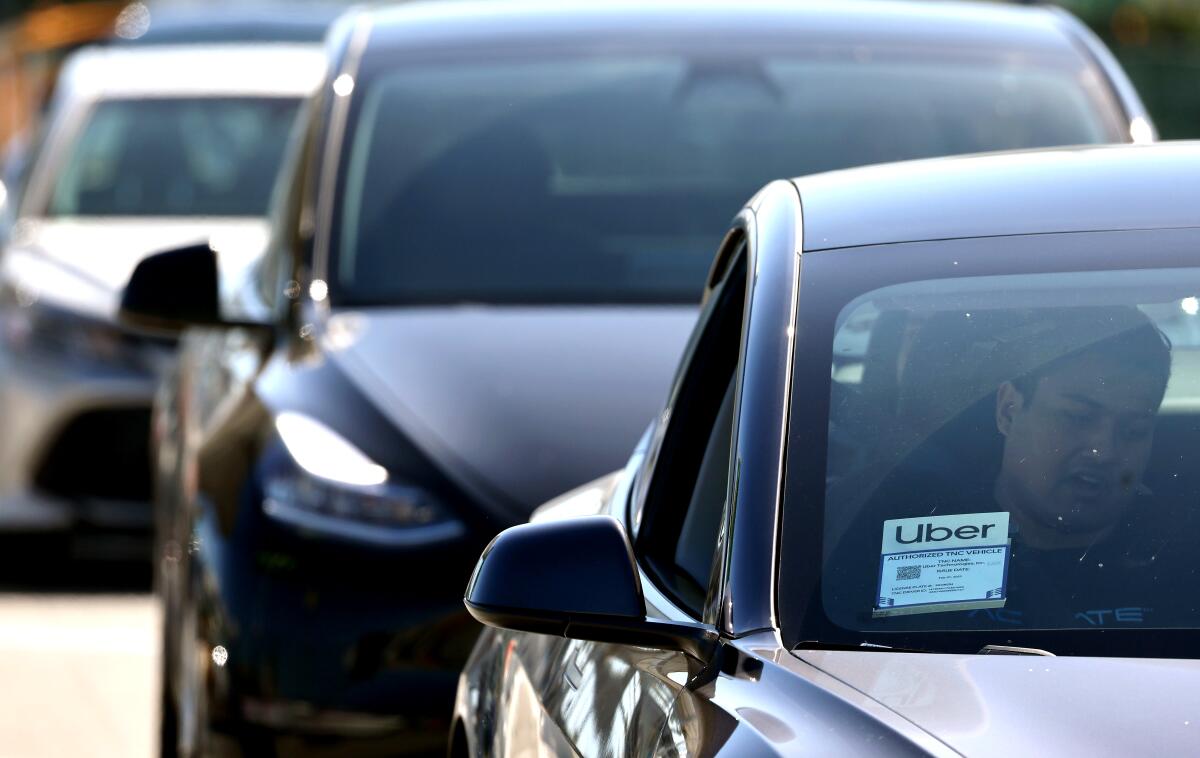In final round of gig drivers’ fight over Prop. 22, California Supreme Court to decide if it stays

- Share via
The California Supreme Court appears poised to uphold Proposition 22, the voter initiative that allows Uber, Lyft and other gig economy companies to classify their ride hail and delivery drivers as independent contractors rather than as employees.
As justices on the state’s top court heard arguments Tuesday afternoon on the constitutionality of the law, their line of questioning suggested they were not persuaded by the argument put forth by those challenging the law: that it should be overturned because it interferes with the state Legislature’s authority to provide workers’ compensation protections to drivers.
The justices, however, appeared to be open to a compromise of sorts offered up by Michael Mongan, solicitor general at the California Department of Justice, in which the state Legislature would amend Proposition 22 to allow drivers access to workers’ compensation benefits.
How the justices ultimately rule will have enormous implications for the delivery and ride hail companies that have argued that their ability to operate in California depends on the law’s survival, as well as the million-plus people in the state who drive for them.
Under the law, drivers are considered to be their own employers, a designation that frees the companies they drive for from having to provide benefits that traditional employees in the state are entitled to, such as overtime, sick leave and a minimum wage.
Uber, Lyft, DoorDash and other companies poured upward of $200 million into a campaign to sway voters in favor of Proposition 22 on the ballot in 2020. It passed with 59% of the vote.
At the hearing Tuesday, Scott Kronland, the attorney representing the union and drivers that brought the lawsuit challenging Proposition 22, reasserted the legal theory he’s used throughout as the case has wound its way through lower courts: The California Constitution has given the Legislature “unlimited” power to regulate workers’ compensation for more than a century.
Justices, however, immediately challenged him, asking why the will of voters, or “initiative power,” shouldn’t be given equal weight.
“What is your evidence that in 1918, when this was adopted, the voters didn’t have in mind the initiative power?” asked Justice Goodwin Liu, referring to the year voters gave lawmakers the authority over workers’ compensation.
“Isn’t the initiative power equal to the Legislature?” Chief Justice Patricia Guerrero asked.
Kurt Oneto, an attorney representing the industry coalition backing Proposition 22, said he is cautiously optimistic the state’s highest court will uphold the law.
“We are confident,” Oneto said. “The court was asking questions around whether or not they could just issue an opinion clarifying the validity of Prop. 22, or whether they should go a step further and discuss the Legislature’s ability or lack thereof to amend Prop. 22 to provide workers’ compensation benefits.”
Kronland declined to speculate on the outcome. “It was a lively oral argument,” he said.
The court must issue its ruling within 90 days of Tuesday’s hearing.
Nicole Moore, one of a group of drivers who rallied outside the Earl Warren Building in San Francisco, where the hearing was held, said the back-and-forth between justices and lawyers was “disempowering and honestly confusing” because it didn’t address the heart of drivers’ concerns: pay and benefits.
“It didn’t feel like justice in that room. The state has to make a decision, if it’s OK to have huge numbers of people managed by algorithms and AI make less than what is possible to live,” Moore said.
In a statement, Uber spokesperson Ramona Prieto said, “Forced employment would be devastating for the thousands of drivers and couriers who turn to Uber for flexible work and the millions of Californians who would see major service reductions and cost increases — or lose ridesharing and food delivery entirely.”
The ride hail companies have considered pulling out of states before. Both Uber and Lyft threatened to stop operating in Minnesota after the state announced a statewide minimum wage for drivers, although they retracted that threat after reaching a compromise with state officials. Earlier this month, Massachusetts’ highest court heard arguments over whether to allow an industry-backed ballot measure similar to Proposition 22 to go before voters in November.
Veena Dubal, a law professor at UC Irvine who has studied pay issues in the gig economy, said that if Proposition 22 is allowed to stand, companies would double down on efforts to legalize the business model “all over the world, not just in other states.”
Lorena Gonzalez, head of the California Labor Federation and a former California assemblywoman, said if Proposition 22 is upheld in whole or in part, labor groups and lawmakers “have a responsibility” to explore other avenues for improving drivers’ working conditions, whether through collective bargaining efforts or amendments giving drivers access to workers’ compensation.
“We knew going in the disposition of most courts is to allow an initiative to stand. What gets carved out or clarified, we have to use to make the world better for rideshare and delivery drivers,” Gonzalez said.
More to Read
Inside the business of entertainment
The Wide Shot brings you news, analysis and insights on everything from streaming wars to production — and what it all means for the future.
You may occasionally receive promotional content from the Los Angeles Times.











